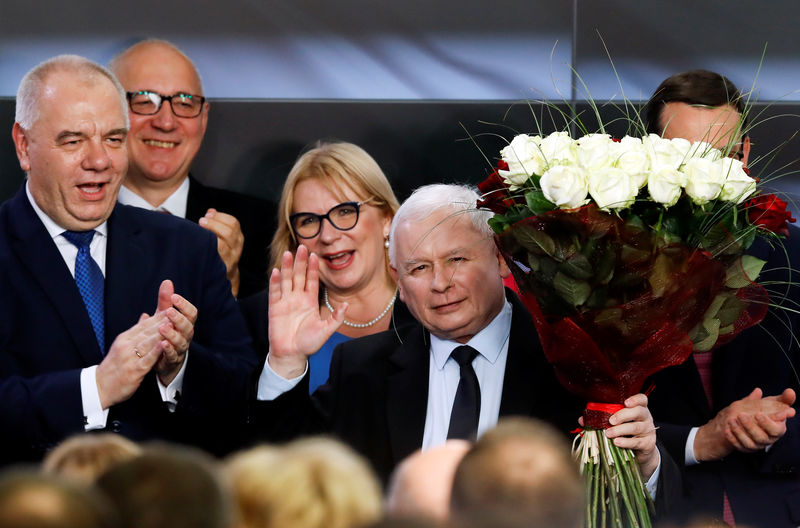By Anna Wlodarczak-Semczuk and Marcin Goclowski
WARSAW, Poland (Reuters) - Poland's nationalist Law and Justice (PiS) was on course to keep its ruling majority after a general election on Sunday, an exit poll showed, a victory likely to stoke concern about democratic standards in the largest ex-Soviet European Union state.
The poll by Ipsos gave PiS 43.6% of the vote, with 27.4% of the ballots going to the centrist Civic Coalition, an umbrella group that includes the Civic Platform formerly led by European Union Council President Donald Tusk. A leftist bloc garnered 11.9% of votes in the poll.
"We have victory," jubilant PiS leader Jaroslaw Kaczynski told party members at the party's headquarters in central Warsaw.
Opposition groups and Poland's EU partners say that during its four years in power, PiS has undermined the independence of the judiciary, forced public media to promote its agenda and taken other steps to quell dissent.
The party has cast the election as a choice between a society rooted in traditional Catholic values and a liberal order that promotes a chosen few and undermines family life.
Critics accused it of fomenting homophobia during the election campaign, with PiS officials calling lesbian, gay, bisexual and transgender (LGBT) rights an invasive foreign influence that threatens Poland's national identity.
The EU has launched unprecedented legal action against PiS over its justice reforms, which PiS says are needed to make courts more efficient and fair.
Under Poland's complex election rules, PiS' result from Sunday's exit poll would translate into 239 seats in the 460-member lower house of parliament, calculations by private broadcaster TVN showed.
Election officials are expected to start announcing partial results on Monday.
DIVIDED SOCIETY
PiS has drawn support from poorer Poles who feel they have missed out on prosperity since the collapse of communism in 1989. The party has mixed nationalist rhetoric with a vast welfare programme financed by an economic boom.
It has depended on close links with Poland's dominant Catholic Church, with senior officials frequently attending religious ceremonies and events, and the party has espoused stronger religious values in public life.
"I see that they are building something, that they are doing something, that they have bought something back, it was all devastated, everything was sold, Poland had nothing, and I support PiS for that," said Teresa Sass, an 85-year-old pensioner in the northern city of Gdansk.
Voter turnout surged to 61.1%, the highest in a parliamentary vote since a 1989 partially-free election that ushered in the end of communist rule in Poland.
"When I talk with my mother, I practice the art of avoidance, I don't get into any ideological discussions with her," said Krzysztof Michalec, 56, as he waited in the sunshine to see PiS leader Jaroslaw Kaczynski cast his vote in Warsaw.
A former opposition activist during communism, Michalec voted for the Civic Platform.
The election will see the return of left-wing parties into parliament, after they lost their seats four years ago because of fragmentation.
The Spring party of Robert Biedron, Poland's first openly gay lawmaker, and Together of Adrian Zandberg campaigned as part of a bloc on a promise to end coal mining and sever the links between church and state.
"We did it, we enter parliament as a third-largest political force," Zandberg was quoted as saying by the state PAP news agency.
PiS has shifted Poland's foreign policy away from the European mainstream, becoming a leading proponent of calls to take some powers away from the EU, with which Warsaw is embroiled in a long-running row over judicial and media reforms.
It has also sought closer ties with U.S. President Donald Trump, with whom it shares views on coal mining, climate and abortion - fuelling concern among some Western EU diplomats that Trump could use Poland to sow discord in Brussels over issues such as Iran.

Deeply distrustful of its former Soviet master, Poland has persuaded Trump to bolster Washington's military presence on Polish soil to counter Russia's growing assertiveness since its 2014 annexation of Crimea from Ukraine.